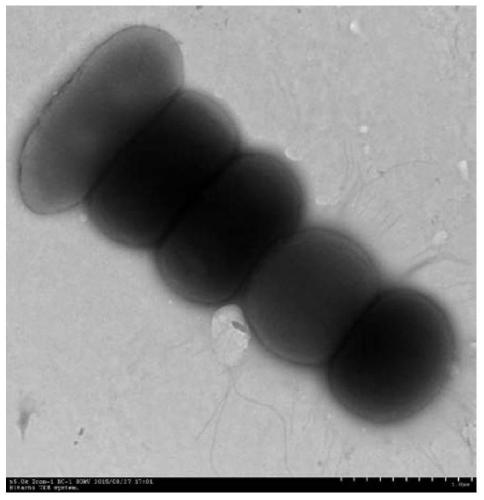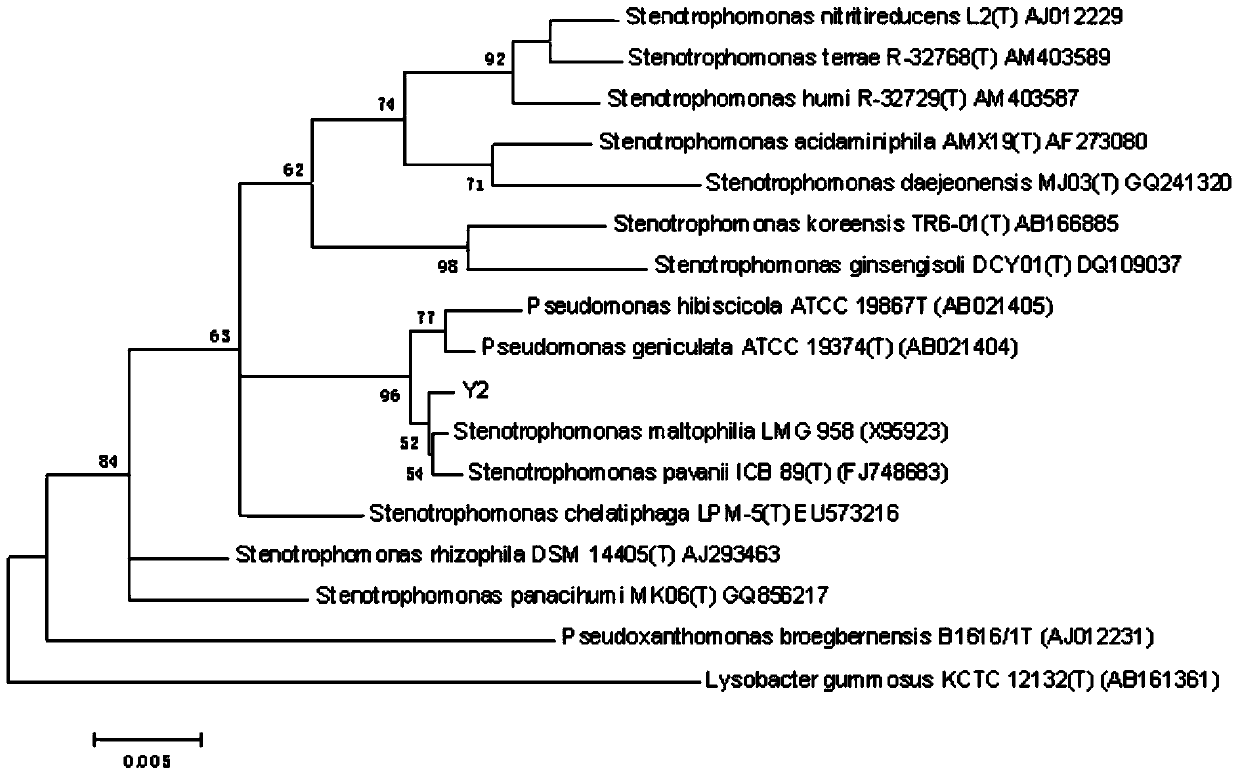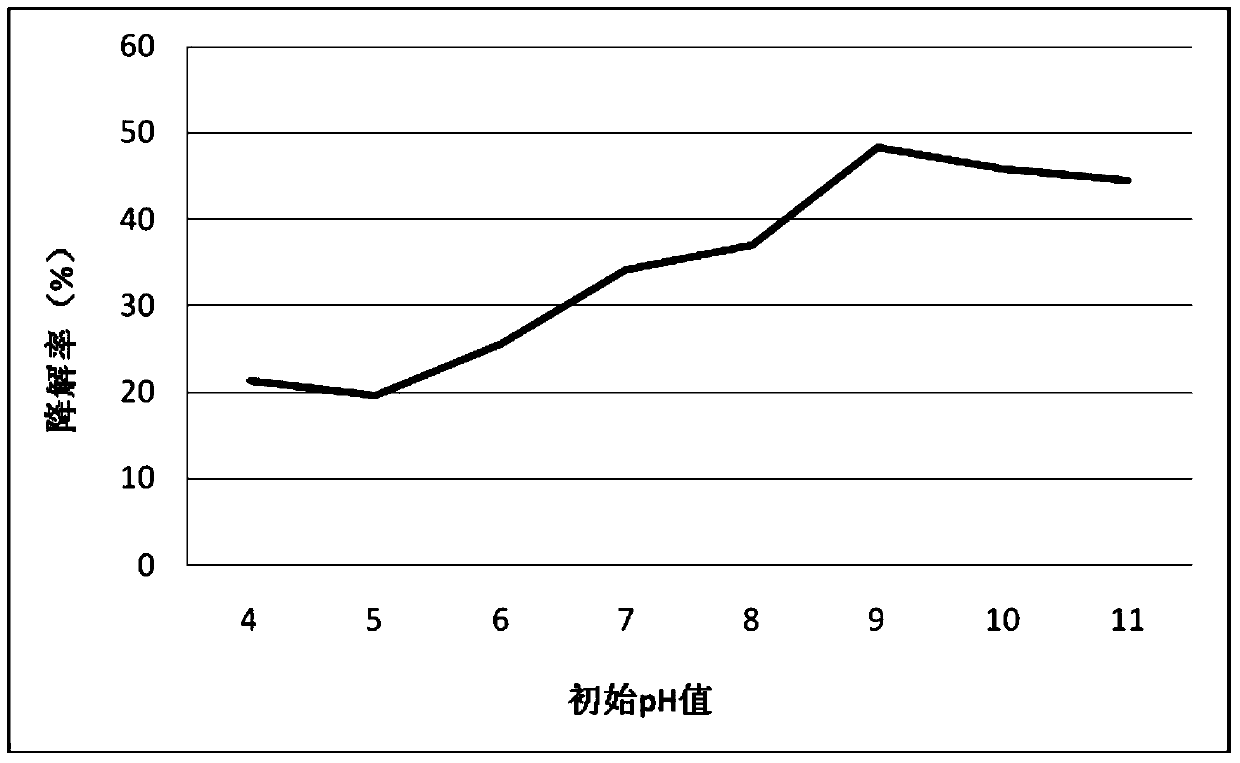Stenotrophomonas maltophilia producing keratinase and its application
A Stenotrophomonas and keratinase technology, applied in microbial strains and application fields, can solve problems such as difficult direct utilization, difficult biodegradation, energy and environmental pollution, etc., and achieve good stability, high degradation rate, and high keratinase activity Effect
- Summary
- Abstract
- Description
- Claims
- Application Information
AI Technical Summary
Problems solved by technology
Method used
Image
Examples
Embodiment 1
[0046] Embodiment 1 is used to illustrate the screening and identification process of bacterial classification:
[0047] 1. Screening method for strains producing keratinase:
[0048] 1) Soil samples were collected from a chicken farm of Guangdong Wens Food Group Co., Ltd.;
[0049] 2) Mix the collected samples in sterile distilled water, take the supernatant after standing, press 10 -6 、10 -7 、10 -8 After performing gradient dilution, spread on the agar plate medium containing milk; then place it in a 37°C incubator and incubate it upside down for 24 hours;
[0050] 3) Select a single colony that can produce a transparent degradation circle on the agar plate medium, inoculate it in a liquid inorganic salt medium containing feathers, and culture it with shaking at a temperature of 37 ° C and 180 rpm for 72 hours to obtain a culture medium for the strain; finally select The culture solution of strains with obvious feather degradation is inoculated into a new feather-contain...
Embodiment 2
[0077] Embodiment 2 is used to illustrate the impact of different pH and different fermentation temperatures on the degradation of feathers by Stenotrophomonas maltophilia:
[0078] 1) Prepare 50 mL of liquid inorganic salt medium with a pH of 4 to 11 according to the gradient;
[0079] 2) Add 0.5 mL of Stenotrophomonas maltophilia and 0.5 g of feathers to each liquid inorganic salt medium prepared in step 1), and ferment for 24 hours under the conditions of rotation speed of 220 rpm and temperature of 37°C , detect the degradation rate of feathers by weight loss method;
[0080] 3) The degradation rate of different pH to feather is as follows: image 3 Shown: the results show that when the pH of the liquid inorganic salt medium=9, the degradation rate of feathers is the highest;
[0081] 4) Take the strain of Stenotrophomonas maltophilia, add it to the liquid inorganic salt medium with pH = 9, at the rotation speed of 220rpm, at the temperature conditions of 27°C, 32°C, 37°...
Embodiment 3
[0084] Embodiment 3 is used to illustrate the impact of the concentration of the substance containing keratin in the liquid inorganic salt medium on the feather degradation rate:
[0085] It is respectively 10g / L (1%), 20g / L (2%), 50g / L (5%) and 100g / L (10%) liquid inorganic salt culture medium that the preparation contains feather concentration, in the inoculum size of bacterial classification 1%, pH=9, temperature is fermentation 24h under the condition of 37 ℃; The degradation rate of feather is as follows Figure 5 Shown: when the content of feather in the liquid inorganic salt medium is 10g / L (1%), the degradation rate of feather is the highest; When feather content is greater than 20g / L (2%), the degradation rate of feather increases with feather content increase and then a rapid decline.
PUM
 Login to View More
Login to View More Abstract
Description
Claims
Application Information
 Login to View More
Login to View More - R&D
- Intellectual Property
- Life Sciences
- Materials
- Tech Scout
- Unparalleled Data Quality
- Higher Quality Content
- 60% Fewer Hallucinations
Browse by: Latest US Patents, China's latest patents, Technical Efficacy Thesaurus, Application Domain, Technology Topic, Popular Technical Reports.
© 2025 PatSnap. All rights reserved.Legal|Privacy policy|Modern Slavery Act Transparency Statement|Sitemap|About US| Contact US: help@patsnap.com



